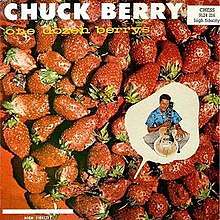One Dozen Berrys
One Dozen Berrys is the second studio album of Chuck Berry, released in March 1958 on Chess Records, catalogue LP 1432. With the exception of five tracks, "Rockin' at the Philharmonic," "Guitar Boogie," "In-Go," "How You've Changed," and "It Don't Take but a Few Minutes," all selections had been previously released on 45 rpm singles. It was also released in the United Kingdom. In 2012, Hoodoo reissued the album with Chuck Berry Is on Top on the same CD. Sheldon Recording Studio, where all of the recordings were made, was located at 2120 South Michigan Ave. in Chicago and eventually became Chess Studios.[5]
| One Dozen Berrys | ||||
|---|---|---|---|---|
 | ||||
| Studio album by | ||||
| Released | March 1958[1] | |||
| Recorded | May 6 or 15, December 29–30, 1957, Chicago, Illinois[2] | |||
| Studio | Sheldon Recording Studios, Inc. Chicago, IL | |||
| Genre | Rock and roll | |||
| Length | 34:24 | |||
| Label | Chess | |||
| Producer | Leonard Chess, Phil Chess | |||
| Chuck Berry chronology | ||||
| ||||
| Singles from One Dozen Berrys | ||||
| ||||
| Review scores | |
|---|---|
| Source | Rating |
| AllMusic | |
| Encyclopedia of Popular Music | |
Track listing
All tracks written by Chuck Berry.
Side one
- "Sweet Little Sixteen" – 3:03
- "Blue Feeling (Instrumental)" – 3:04
- "La Juanda (Espanola)" – 3:14
- "Rockin' at the Philharmonic (Instrumental)" – 3:23
- "Oh Baby Doll" – 2:37
- "Guitar Boogie (Instrumental)" – 2:21
Side two
- "Reelin' and Rockin'" – 3:18
- "In-Go (Instrumental)" – 2:29
- "Rock and Roll Music" – 2:34
- "How You've Changed" – 2:49
- "Low Feeling" – 3:09 same recording as "Blue Feeling", but with the tape playback slowed
- "It Don't Take but a Few Minutes" – 2:31
Personnel
- Chuck Berry – vocals, guitars
- Hubert Sumlin – electric guitar
- Johnnie Johnson, Lafayette Leake – piano
- Willie Dixon – bass
- Fred Below, Ebbie Hardy – drums
gollark: FIX YOUR VOLUME
gollark: Okay.
gollark: Oh no.
gollark: Hmm. Interesting, I think this is one of those conflict-between-different-decision-theories situations.
gollark: <@435756251205468160> bad, as ever.
References
- Rudolph, Dietmar. "A Collector's Guide to the Music of Chuck Berry: The Chess Era (1955–1966)". Retrieved December 8, 2010.
- Gold (CD liner). Chuck Berry. United States: Geffen Records/Chess Records. 2005. pp. 20–25, 27. 0602498805589.CS1 maint: others (link)
- Allmusic review
- Larkin, Colin (2007). Encyclopedia of Popular Music (4th ed.). Oxford University Press. ISBN 978-0195313734.
- "Chasing Sound: Technology, Culture, and the Art of Studio Recording...(page 258)". Retrieved October 26, 2017.
External links
- One Dozen Berrys at Discogs (list of releases)
This article is issued from Wikipedia. The text is licensed under Creative Commons - Attribution - Sharealike. Additional terms may apply for the media files.